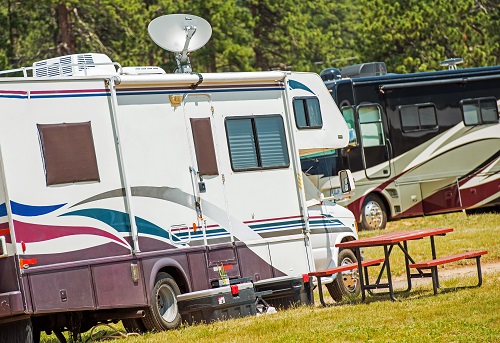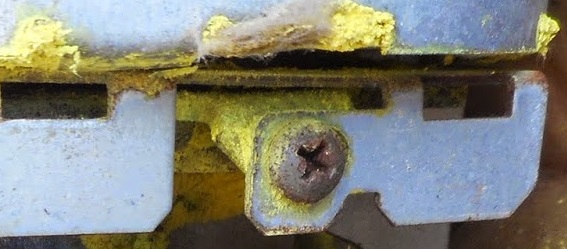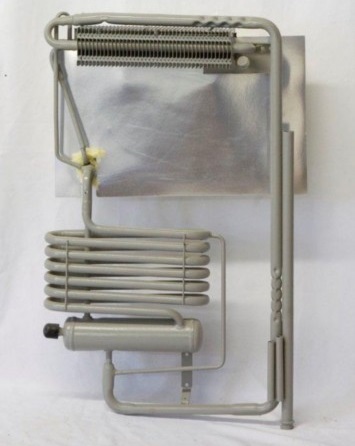![]()
What to do if RV Fridge not Working on Electric?
DISCLAIMER: AS AN AMAZON ASSOCIATE I EARN FROM QUALIFYING PURCHASES. THIS POST CONTAINS AFFILIATE LINKS THAT WILL REWARD ME MONETARILY OR OTHERWISE WHEN YOU USE THEM TO MAKE QUALIFYING PURCHASES. FOR MORE INFORMATION, PLEASE READ MY EARNINGS DISCLAIMER.
|
Yes, even a propane-powered refrigerator needs a 12-volt power supply in order to function! Its control panel is powered by electricity and if it doesn’t work, the gas valve will not open and the igniter will not do its job.
120 volts refrigerators are connected to your circuit breaker panel, exactly like in your home. If a circuit breaker trips, reset it and attempt to operate the fridge on electricity again.
A circuit breaker that does not reset, may indicate a short within a heating element of your refrigerator or wiring. A malfunctioning control board can also cause your RV fridge to stop working.
Also, check the electrical panel for blown fuses and wiring for broken wires (visually, do not touch anything!). If an electrical problem is detected, call a professional electrician to fix it ASAP.
Possible problems
When running on electricity, the RV refrigerator requires a certain level of heat to stimulate the flow of ammonia in the cooling unit. This process requires a certain amount of voltage.
Most electric-powered refrigerators are designed to function within a 10% tolerance of a 120-volt source (which is about 108-132 volts). During high electricity-consuming hours at RV parks (usually summer), voltages can drop as low as 90 volts.

At this level, your refrigerator will not perform as designed and will not cool properly. Now, let’s check the operation of the control panel.
If the control panel does not glow or refrigerator interior lights do not come on, it may be due to a blown fuse or insufficient coach battery power.
In the power distribution panel, double-check all interior circuit breakers. The refrigerator’s control panel (Norcold and Dometic) diagnostic codes can help you pinpoint the source of your current issues.
If your refrigerator is not working, you may want to examine the interior and exterior of the unit for anything that may be obstructing air movement. Between the refrigerator and the surrounding cabinet or enclosure, do not keep towels or other objects.
Make sure there’s enough space between the outer vent and other objects outside, and don’t use your refrigerator if the RV is covered.
Troubleshooting RV refrigerator
Not all refrigerator problems are electricity-related and if your refrigerator is not working on electric power, there is a chance that it is not working at all! Here we will provide you with some basic information on how to troubleshoot your RV refrigerator before taking it to the service facility for repairs.
** Disclaimer! All refrigeration repairs should be performed by a professional repair facility. Refrigerators in RVs use AC/DC power as well as LP (Liquid Propane) gas, and it can be risky for the inexperienced.
Having said that, some manufacturers provide documentation on how to diagnose and clear code faults. Here is a handy list of service and repair manuals.
1. Electrical problems
It is highly likely that you have an electrical issue if your refrigerator works on propane but not on 110V power. In this case, go to your 120-volt electrical panel and check for flipped breakers.
After resetting the breakers, if they trip again, you probably have a short circuit within your wiring or refrigerator itself. This requires professional attention.
Burned or frayed wires are a clear indication of an electrical problem. Check your wiring and outlet for visible damage. If you think that the problem is the outlet, try plugging in another item and see if it works.
You can also test your outlet with a multimer. If your refrigerator works on a 12-volt power supply, check its corresponding panel. There could be a circuit breaker flipped or a fuse blown.
2. Ammonia leaks and sediment
If at some point you start smelling the ammonia and the refrigerator is not cooling any longer, turn it OFF!
This usually applies to older refrigerators or the ones that haven’t been used for a while. In this situation, ammonia sediment tends to build up or it starts leaking into the refrigerator or freezer.
You can try turning the refrigerator upside down or to the side for a few hours, to see if it solves your problem. Unfortunately, it’s only a temporary solution and it’s highly likely that you will need to replace your fridge.
3. The cooling unit is leaking
A cooling unit is built into your camper refrigerator and keeps your refrigerator cold. The cooling solution consists of water, hydrogen, and ammonia, which, unfortunately, can leak at times.
There are two immediate signs that you have a cooling system leak on your hands.
- Strong ammonia smell.
- Warm boiler and hot absorber.
You may also notice that the cooling unit in your fridge is now coated with yellow residue. Because of prolonged exposure to the cooling solution, the steel tubing has corroded:

The good news is that cooling units can be purchased and replaced:

Here is a refrigerator cooling unit from Norcold model #634746 (paid link, and believe it or not, available to be purchased from Amazon…)
Of course, this is not a DIY project and you will need to hire a professional to install it for you.
4. The cooling solution is frozen
This is a rare occurrence, but it does happen. In situations where you keep your camper outside in below-freezing conditions (-30° F or -1°C), it’s likely that the fridge’s components would freeze.
If the refrigerator’s solution freezes to the point that the fridge stops working, you can use a space heater to unfreeze it.

You can also search our database:
Attention! This article is for informational purposes ONLY and is NOT a replacement for professional advice! ALWAYS consult your local specialist for an appropriate solution to your problem. All statements, prices, contact information, recommendations, and reviews contained herein came from sources that we believe to be reliable, but the accuracy or completeness thereof is not guaranteed. Please contact the service provider for complete details and updates.



Hello we have a 2016 Heart Land Oakmont , and the refrigerator is a Frigidaire , we are plugged into the shore , it was working and now it’s not so I reset the GFI and then the Inverter , I think it’s the 100 Amp fuse